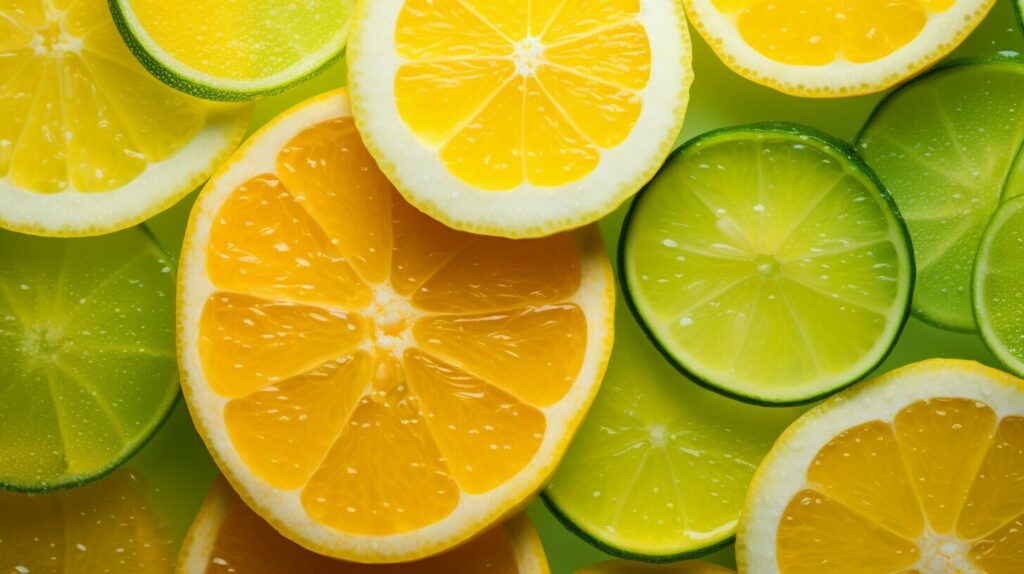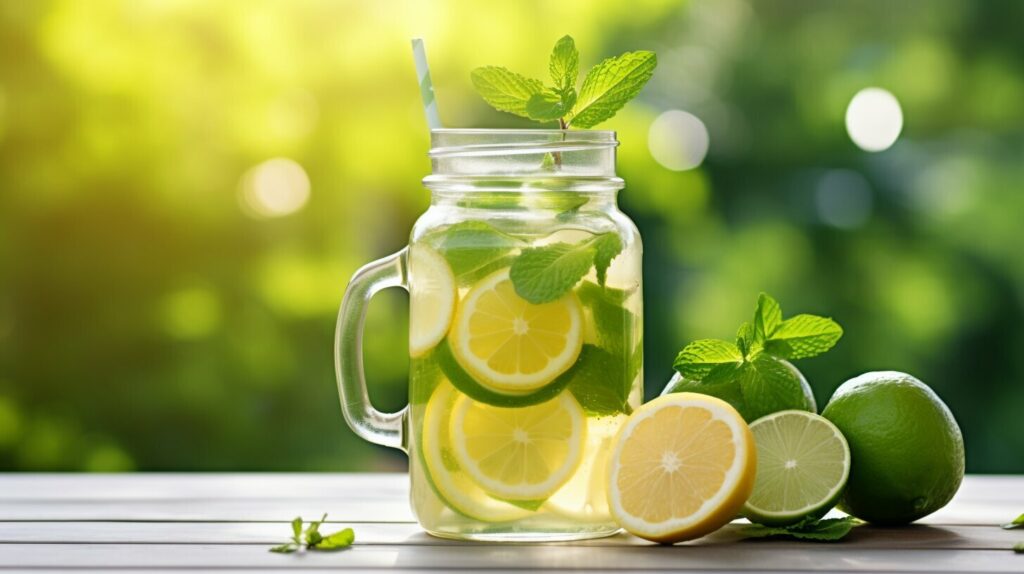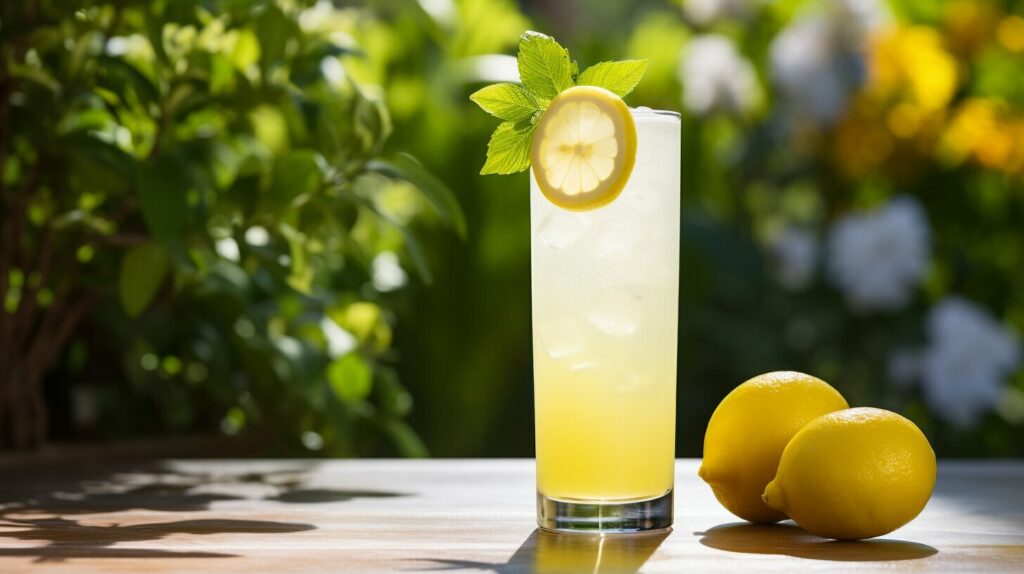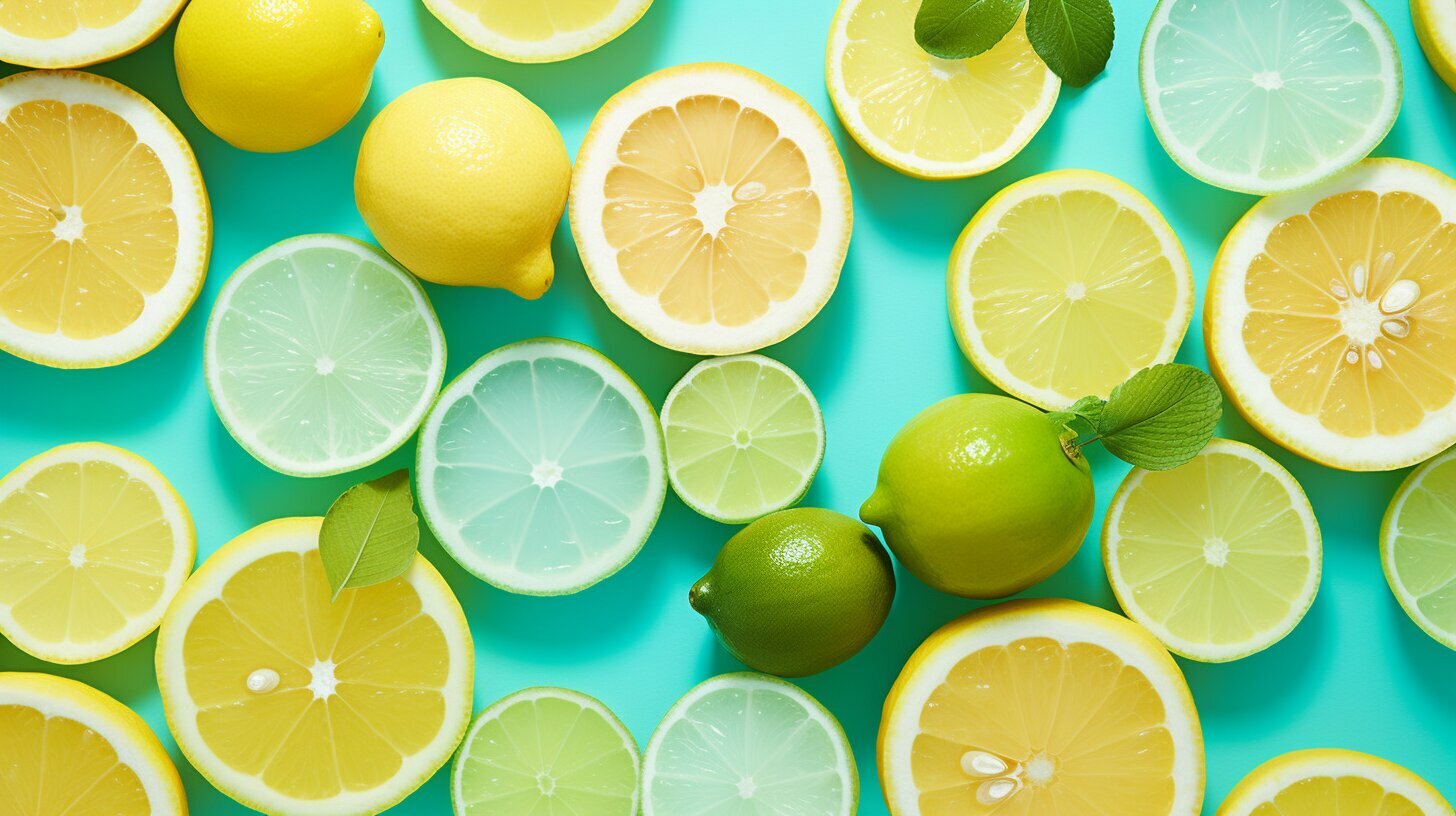When it comes to refreshing citrus beverages, lemonade and limeade are two of the most popular options. While both drinks share some similarities, they also have distinct differences in terms of flavor, ingredients, and uses. In this article, we’ll take a closer look at the difference between lemonade and limeade, exploring what sets these tangy drinks apart.
Key Takeaways:
- Lemonade and limeade are both citrus beverages.
- Lemonade has a sweeter taste and is made with lemons, while limeade is more tangy and is made with limes.
- Both drinks can be used as mixers in cocktails, or incorporated into recipes for desserts and savory dishes.
- Lemonade and limeade may offer health benefits, including vitamin C and hydration.
- Personal preference often plays a role in choosing between lemonade and limeade.
Flavor Profiles
While both lemonade and limeade are citrus-based beverages, they have distinct flavor profiles. Lemonade is known for its tart, tangy taste with a subtle sweetness. The flavor of limeade, on the other hand, is often described as more sour and bitter than lemonade, with a stronger citrus kick.
The differences in flavor can be attributed to the unique chemical compounds found in lemons and limes. Lemons contain more citric acid, giving them a more acidic taste, while limes have a higher concentration of malic acid, which can create a sour taste sensation.
Overall, lemonade is a classic refreshing drink that offers a balance of tart and sweet flavors, while limeade has a more intense and bold taste that is preferred by those who enjoy a punchier citrus beverage.

Citrus fruits are the primary source of flavor for both lemonade and limeade
Ingredients
Both lemonade and limeade have their own unique flavors, which are determined by the ingredients that go into each drink.
| Ingredient | Lemonade | Limeade |
|---|---|---|
| Lemons/Limes | As the name suggests, lemonade is made using lemons. The lemons are juiced and mixed with water and sugar to create the classic drink. Depending on the recipe, lemonade may also include lemon zest or pulp for added flavor. | Limeade, on the other hand, is made using limes. Like lemonade, the limes are juiced and mixed with water and sugar. Limeade can have a slightly more tart flavor than lemonade due to the nature of the lime fruit. |
| Sugar/Sweetener | Sugar is a common sweetener used in lemonade. However, some recipes may use honey, agave nectar, or other sweeteners to add a unique taste. | Like lemonade, sugar is often the sweetener of choice in limeade. However, some recipes may use honey or other sweeteners for a more nuanced taste. |
| Water | Water is a key ingredient in lemonade and is used to dilute the lemon juice, making the drink less acidic and more refreshing. | Similarly, water is used to dilute the lime juice in limeade. This helps to balance out the tartness of the lime and create a more palatable drink. |
| Ice | Lemonade is traditionally served over ice, making it a refreshing and cooling drink, especially on a hot summer day. | Limeade is often served over ice as well, making it the perfect beverage for a hot day or to enjoy alongside a meal. |
While the main ingredients of lemonade and limeade are similar, the use of lemons versus limes, as well as the amount of sugar and water used, can have a significant impact on the overall flavor of each drink.

Uses
Lemonade and limeade are popular beverages that can be enjoyed in a variety of ways. They are commonly consumed on their own as a refreshing drink on hot summer days.
Many people also use these citrus drinks as mixers in cocktails. For example, a classic margarita is made with limeade, tequila, and triple sec.
Another popular use for lemonade and limeade is in cooking and baking. These beverages can be incorporated into recipes for desserts, such as lemon bars or key lime pie, or used as a marinade for chicken or fish.
Additionally, lemonade and limeade can be used to add a tangy, citrus flavor to savory dishes. For example, a splash of lemonade can be added to a salad dressing or used as a glaze for grilled vegetables.

Overall, the uses for lemonade and limeade are diverse and can enhance the flavor of many dishes and drinks.
Health Benefits of Lemonade and Limeade
Lemonade and limeade are not only refreshing beverages, but they also offer potential health benefits. Both drinks are high in vitamin C, which is essential for maintaining a healthy immune system. Vitamin C also plays a role in collagen production, which is important for healthy skin, hair, and nails.
In addition to their vitamin C content, lemonade and limeade can also help quench thirst and keep you hydrated. Proper hydration is crucial for optimal bodily function, and staying hydrated can also improve skin health and boost cognitive function.
Some studies suggest that the citrus fruits used in these beverages may also have antioxidant properties. Antioxidants can help protect your cells against damage from free radicals, which can lead to chronic diseases such as cancer and heart disease.
While lemonade and limeade can be high in sugar, there are ways to enjoy them in a healthier way. Consider using natural sweeteners, such as honey or stevia, instead of processed sugar. You can also opt for low-sugar or sugar-free versions of these drinks.

“Lemonade and limeade are citrus beverages that offer potential health benefits, such as high vitamin C content and possible antioxidant properties.”
Drinking Preferences
When it comes to lemonade and limeade, personal preferences can vary widely. Some people prefer the sweeter taste of lemonade, while others enjoy the tanginess of limeade. Additionally, certain factors may influence taste preferences, such as culture, upbringing, and individual taste buds.
Interestingly, regional variations in popularity also exist. In the Southern United States, for example, lemonade is often the go-to citrus beverage, while in Latin America and the Caribbean, limeade is more commonly consumed.

Ultimately, the choice between lemonade and limeade comes down to personal taste. Both beverages offer unique and refreshing flavors that can be enjoyed in a variety of ways. Whether you prefer the sweetness of lemonade or the tanginess of limeade, these citrus drinks are sure to quench your thirst and satisfy your taste buds.
Conclusion on Lemonade and Limeade
After exploring the differences between lemonade and limeade, it is clear that these two beverages offer unique flavors, uses, and potential health benefits.
While lemonade is known for its tangy sweetness and refreshing taste, limeade offers a more sour and tart profile. Both beverages can be enjoyed on their own or incorporated into recipes for cocktails, desserts, and savory dishes.
In terms of potential health benefits, both lemonade and limeade offer hydrating properties and a good dose of vitamin C. However, lemonade may be more effective in supporting the immune system due to its higher vitamin C content.
Personal preference plays a significant role in which beverage individuals prefer. Factors such as taste preferences and regional popularity may also influence drinking habits.
In summary, whether you prefer the classic sweetness of lemonade or the sharp tanginess of limeade, both beverages offer a refreshing and delicious way to stay hydrated and potentially reap some health benefits.
FAQ
Q: What is the difference between lemonade and limeade?
A: Lemonade is made with lemons, while limeade is made with limes. This difference in citrus fruit gives each beverage its distinct flavor.
Q: How do the flavors of lemonade and limeade compare?
A: Lemonade is known for its tangy and sweet taste, with a strong lemon flavor. Limeade, on the other hand, has a slightly less tangy taste and a more subtle sweetness, with a prominent lime flavor.
Q: What ingredients are used to make lemonade and limeade?
A: Lemonade typically requires lemons, water, and sugar. Limeade, on the other hand, uses limes, water, and sugar. Additional ingredients, such as mint or berries, may be added to enhance the flavor of both beverages.
Q: How can lemonade and limeade be enjoyed?
A: Both lemonade and limeade can be enjoyed on their own as refreshing beverages. They can also be used as mixers in cocktails or incorporated into various recipes, such as lemonade iced tea or limeade popsicles.
Q: Are there any health benefits to drinking lemonade and limeade?
A: Lemonade and limeade are both good sources of vitamin C and can help to keep you hydrated. They may also offer other nutritional benefits, such as antioxidant properties from citrus fruits.
Q: Why do some people prefer lemonade over limeade, or vice versa?
A: Personal taste preferences play a big role in why some individuals prefer lemonade over limeade or vice versa. Factors such as acidity, sweetness, and regional preferences can all influence which beverage someone prefers.
Conclusion
In conclusion, lemonade and limeade have distinct flavors, ingredients, uses, and potential health benefits. Whether you prefer the tanginess of lemonade or the subtler sweetness of limeade, both beverages offer refreshing options for quenching your thirst or adding a citrus twist to your drinks and recipes.
 Skip to main content
Skip to main content


